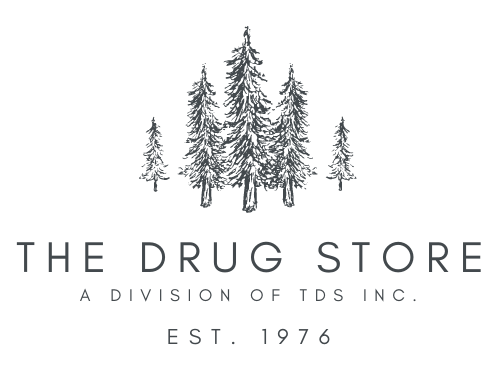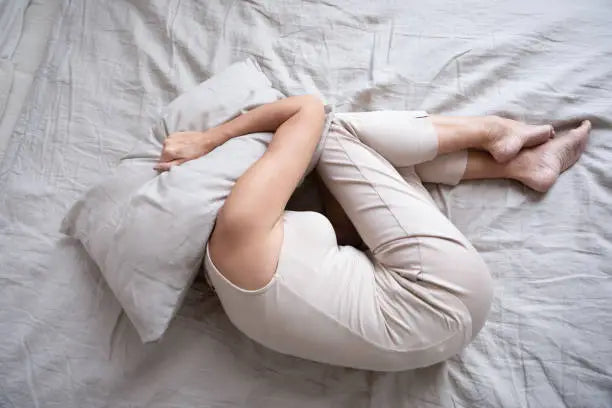ADHD doesn’t take a break when the day ends. For many people, settling down for sleep feels like an uphill battle. Racing thoughts, mental hyperactivity, and a restless mind often make falling and staying asleep an ongoing challenge.
Sleep struggles aren’t just incidental—they’re deeply tied to ADHD, affecting both nightly rest and daily functioning.
The Drug Store offers tailored solutions designed for individuals facing these struggles. From pharmacist-formulated sleep aids to expert guidance, our support empowers individuals with ADHD to unlock better sleep and improved overall wellness.
Why the ADHD Brain Struggles to Power Down
For those with ADHD, certain neurological characteristics make sleep a notorious challenge.
-
Racing thoughts and mental hyperactivity often kick into overdrive when lying in bed, making relaxation feel nearly impossible.
-
Dysregulated dopamine and melatonin release can interfere with the natural sleep-wake cycle, making it harder to feel tired at night.
-
Executive dysfunction complicates the ability to build and stick to consistent bedtime routines.
Sleep Deprivation Worsens ADHD Symptoms
A lack of quality rest doesn’t just impact nighttime; it worsens daytime challenges too. Poor sleep can elevate many ADHD symptoms, creating a frustrating cycle.
-
Impulsivity, irritability, and inattention intensify with insufficient rest.
-
Mood instability and greater stress responses are common outcomes.
-
Disrupted circadian rhythms may leave individuals feeling trapped in a loop of sleep resistance and daytime fatigue.
Common Sleep Challenges for People with ADHD
Difficulty Falling Asleep
Falling asleep often feels impossible, especially with these common barriers at bedtime:
-
Bedtime procrastination fueled by hyperfocus on stimulating activities such as screen time or work.
-
Sensory overload and an absence of calming wind-down routines disrupt the body’s ability to relax.
Trouble Staying Asleep or Waking Too Early
Some individuals with ADHD struggle with restless or fragmented sleep, causing them to wake frequently.
-
Restless sleep and nighttime awakenings make deep, restorative sleep hard to achieve.
-
Midnight anxiety or a rush of racing thoughts can disrupt sleep even at calm moments.
Delayed Sleep Phase Syndrome (DSPS)
Naturally shifted sleep patterns are another common issue for individuals with ADHD who identify as night owls.
-
DSPS often causes a misalignment between biological sleep-wake cycles and societal expectations like work or school hours.
-
Night owls face heightened struggles, especially in adhering to ideal bedtime schedules.
Effective Strategies to Improve Sleep with ADHD
Cognitive and Behavioral Approaches
-
Establish a structured nighttime routine with calming pre-sleep activities like reading or light stretching.
-
Implement “if-then” planning to reinforce good habits (e.g., “If my alarm rings, then I’ll put my phone away.”).
-
Consider Cognitive Behavioral Therapy for Insomnia (CBT-I), which has shown significant effectiveness in managing ADHD-related sleep challenges.
Environmental Adjustments That Help
Small changes to your surroundings can create a more sleep-friendly environment:
-
Use dim lighting and wear blue light blockers in the evening to prep your brain for rest.
-
Try sensory aids like weighted blankets, white noise machines, or calming tactile tools.
Nutritional and Supplemental Support
-
Supplements such as magnesium, melatonin, and L-theanine can support better sleep. However, they need thoughtful use—consult a pharmacist or healthcare provider.
-
Avoid substances like caffeine or sugar, especially in the evening, to reduce nightly hyperactivity.
You can find ADHD-compatible sleep aids and supplements at The Drug Store, where every recommendation is pharmacist-reviewed to ensure safe usage.
The Role of Medication in ADHD-Related Sleep Struggles
Stimulants and Their Sleep Impact
-
Timing matters—late doses of ADHD medication may disrupt the ability to wind down at night.
-
Even extended-release stimulants can prolong wakefulness if not carefully scheduled.
Non-Stimulant Alternatives and Sleep Benefits
-
Medications like guanfacine and clonidine provide calming effects, aiding in falling and staying asleep.
-
Discuss options with your healthcare provider to determine the best regimen for you.
What Makes ADHD Sleep Plans Work: Consistency, Patience, and Support
Setting Realistic Expectations
Change takes time, and the path to improved sleep isn’t always linear. To track progress effectively:
-
Keep a sleep journal to identify patterns and challenges.
-
Celebrate small wins, knowing that consistency will lead to better outcomes over time.
Don’t Go It Alone—Build Your Support System
-
Seek expert advice when necessary, such as consulting a sleep specialist or ADHD coach.
-
Utilize The Drug Store’s services to collaborate with pharmacists who can guide you toward appropriate supplements and routines.
Rest Solutions, Personalized: How The Drug Store Supports ADHD Sleep

At The Drug Store, we understand that ADHD-related sleep issues aren’t one-size-fits-all. We work closely with both patients and prescribers to customize medication regimens, including compounded or alternative formulations designed to reduce sleep disruption without compromising focus or daily function.
Beyond prescriptions, we offer expert guidance on supplements that support rest—from pharmacist-formulated sleep aids to calming nutrients tailored for the ADHD brain. Our personalized consultations are designed to help you connect the dots between your treatment plan and true nighttime relief, so you can finally rest with confidence.
Conclusion: It’s Time to Sleep Smarter with ADHD
ADHD may disrupt sleep, but it doesn’t have to lead to a lifetime of insomnia and restless nights. Small, deliberate changes, supported by effective tools and expert guidance, can unlock consistent and restorative sleep.
The Drug Store is here to help. Make impactful changes to your sleep routine today with personalized advice and solutions designed just for you. Contact us!

